Analyzing Mark Zuckerberg's Leadership: BUSN3052 Group Report
VerifiedAdded on 2022/11/29
|7
|1949
|277
Report
AI Summary
This report provides a comprehensive analysis of Mark Zuckerberg's leadership style, focusing on his role as the founder of Facebook. It begins with a brief overview of Zuckerberg, his company, and the social media industry. The report then delves into an analysis of his leadership behavior, applying the Team Leader style from the leadership grid theory, highlighting his emphasis on both employee satisfaction and achieving goals. It examines how Zuckerberg influences subordinates, communicates, and fosters leader-member exchange relationships, citing real-world examples of his practices, such as removing traditional hierarchies, providing employee perks, and empowering his employees. The report further analyzes the extent to which these practices have contributed to his effectiveness as a leader. It emphasizes his vision, ability to communicate, and willingness to embrace change as key factors in his success, concluding that Zuckerberg's leadership style has been instrumental in Facebook's growth and innovation.
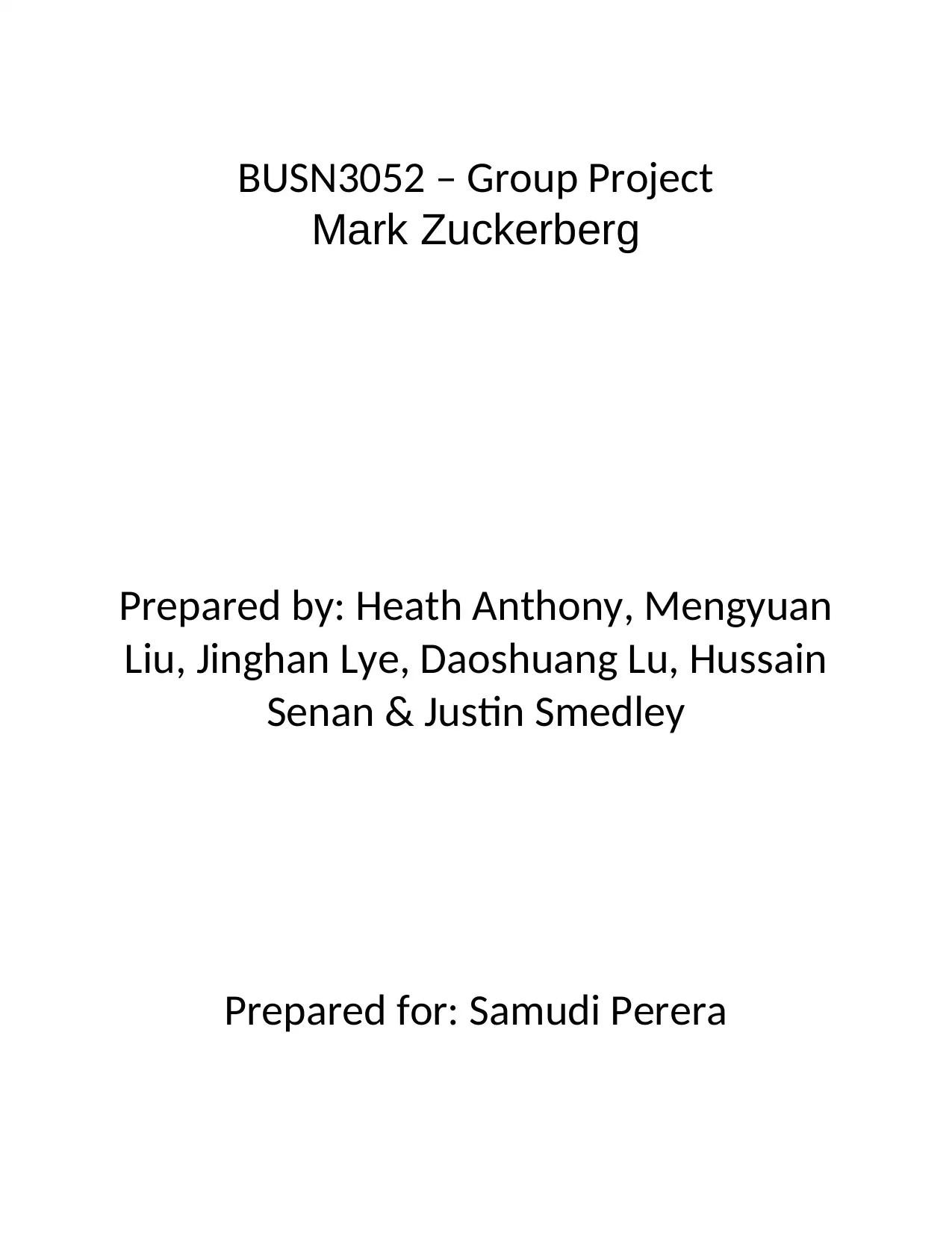
BUSN3052 – Group Project
Mark Zuckerberg
Prepared by: Heath Anthony, Mengyuan
Liu, Jinghan Lye, Daoshuang Lu, Hussain
Senan & Justin Smedley
Prepared for: Samudi Perera
Mark Zuckerberg
Prepared by: Heath Anthony, Mengyuan
Liu, Jinghan Lye, Daoshuang Lu, Hussain
Senan & Justin Smedley
Prepared for: Samudi Perera
Paraphrase This Document
Need a fresh take? Get an instant paraphrase of this document with our AI Paraphraser
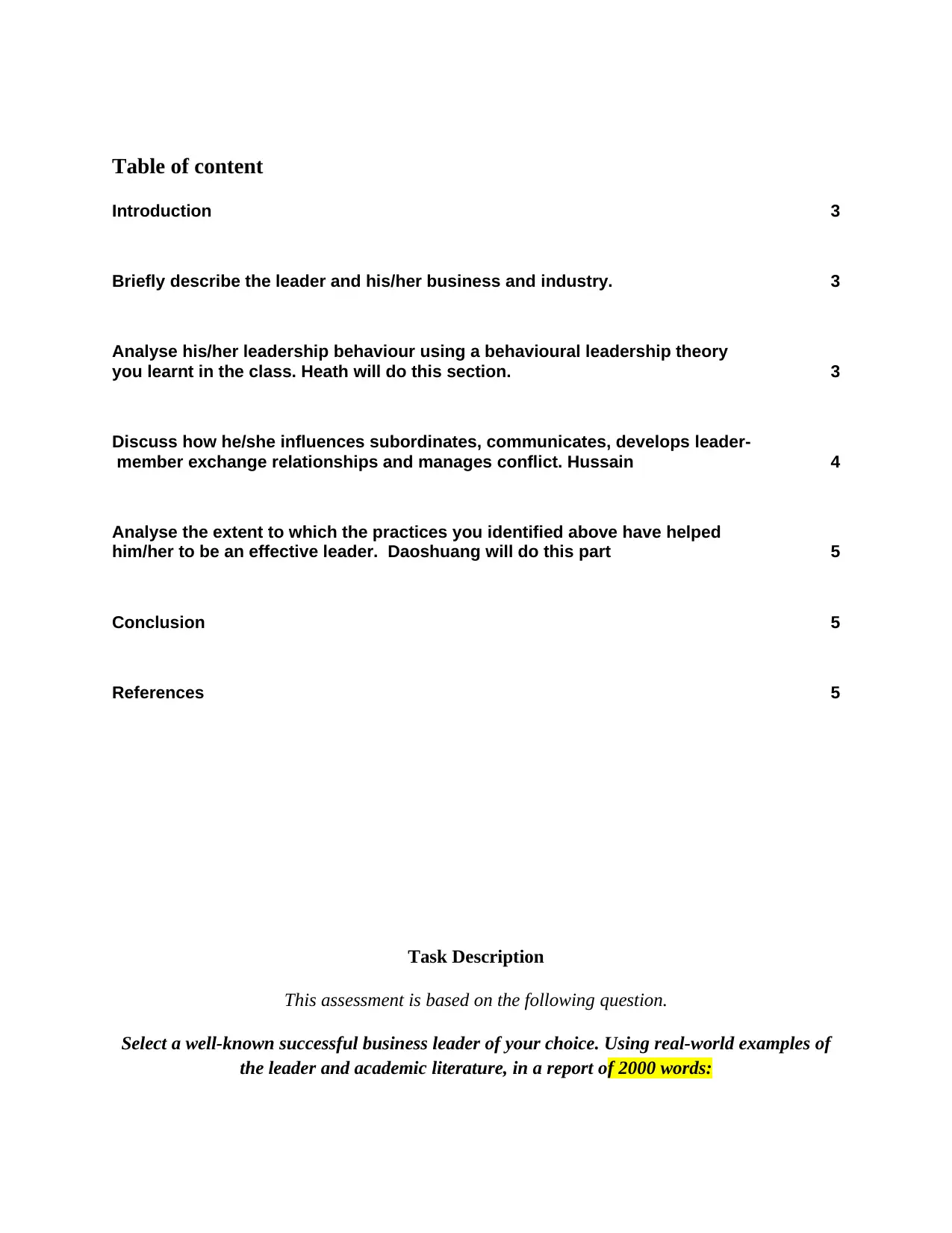
Table of content
Introduction 3
Briefly describe the leader and his/her business and industry. 3
Analyse his/her leadership behaviour using a behavioural leadership theory
you learnt in the class. Heath will do this section. 3
Discuss how he/she influences subordinates, communicates, develops leader-
member exchange relationships and manages conflict. Hussain 4
Analyse the extent to which the practices you identified above have helped
him/her to be an effective leader. Daoshuang will do this part 5
Conclusion 5
References 5
Task Description
This assessment is based on the following question.
Select a well-known successful business leader of your choice. Using real-world examples of
the leader and academic literature, in a report of 2000 words:
Introduction 3
Briefly describe the leader and his/her business and industry. 3
Analyse his/her leadership behaviour using a behavioural leadership theory
you learnt in the class. Heath will do this section. 3
Discuss how he/she influences subordinates, communicates, develops leader-
member exchange relationships and manages conflict. Hussain 4
Analyse the extent to which the practices you identified above have helped
him/her to be an effective leader. Daoshuang will do this part 5
Conclusion 5
References 5
Task Description
This assessment is based on the following question.
Select a well-known successful business leader of your choice. Using real-world examples of
the leader and academic literature, in a report of 2000 words:
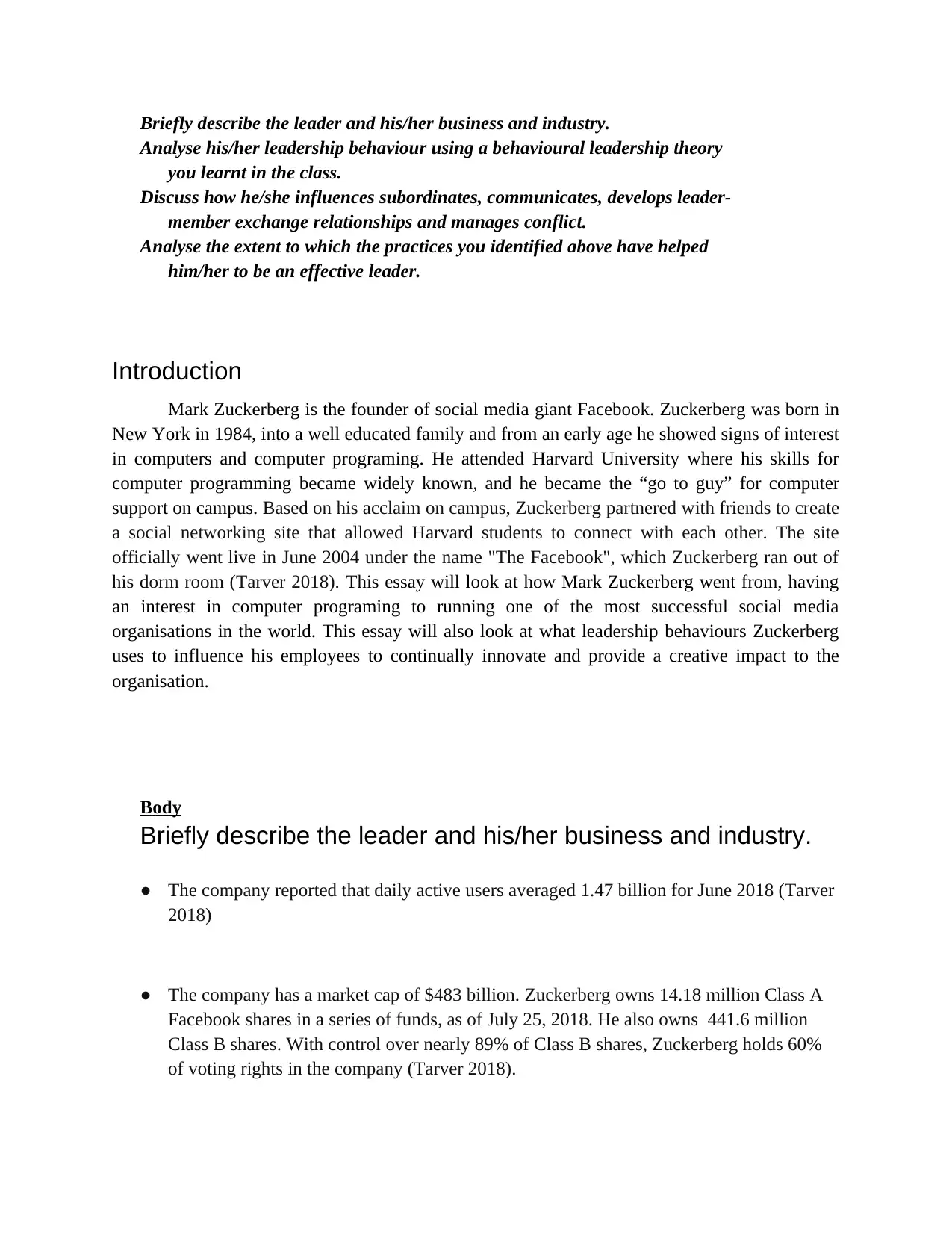
Briefly describe the leader and his/her business and industry.
Analyse his/her leadership behaviour using a behavioural leadership theory
you learnt in the class.
Discuss how he/she influences subordinates, communicates, develops leader-
member exchange relationships and manages conflict.
Analyse the extent to which the practices you identified above have helped
him/her to be an effective leader.
Introduction
Mark Zuckerberg is the founder of social media giant Facebook. Zuckerberg was born in
New York in 1984, into a well educated family and from an early age he showed signs of interest
in computers and computer programing. He attended Harvard University where his skills for
computer programming became widely known, and he became the “go to guy” for computer
support on campus. Based on his acclaim on campus, Zuckerberg partnered with friends to create
a social networking site that allowed Harvard students to connect with each other. The site
officially went live in June 2004 under the name "The Facebook", which Zuckerberg ran out of
his dorm room (Tarver 2018). This essay will look at how Mark Zuckerberg went from, having
an interest in computer programing to running one of the most successful social media
organisations in the world. This essay will also look at what leadership behaviours Zuckerberg
uses to influence his employees to continually innovate and provide a creative impact to the
organisation.
Body
Briefly describe the leader and his/her business and industry.
● The company reported that daily active users averaged 1.47 billion for June 2018 (Tarver
2018)
● The company has a market cap of $483 billion. Zuckerberg owns 14.18 million Class A
Facebook shares in a series of funds, as of July 25, 2018. He also owns 441.6 million
Class B shares. With control over nearly 89% of Class B shares, Zuckerberg holds 60%
of voting rights in the company (Tarver 2018).
Analyse his/her leadership behaviour using a behavioural leadership theory
you learnt in the class.
Discuss how he/she influences subordinates, communicates, develops leader-
member exchange relationships and manages conflict.
Analyse the extent to which the practices you identified above have helped
him/her to be an effective leader.
Introduction
Mark Zuckerberg is the founder of social media giant Facebook. Zuckerberg was born in
New York in 1984, into a well educated family and from an early age he showed signs of interest
in computers and computer programing. He attended Harvard University where his skills for
computer programming became widely known, and he became the “go to guy” for computer
support on campus. Based on his acclaim on campus, Zuckerberg partnered with friends to create
a social networking site that allowed Harvard students to connect with each other. The site
officially went live in June 2004 under the name "The Facebook", which Zuckerberg ran out of
his dorm room (Tarver 2018). This essay will look at how Mark Zuckerberg went from, having
an interest in computer programing to running one of the most successful social media
organisations in the world. This essay will also look at what leadership behaviours Zuckerberg
uses to influence his employees to continually innovate and provide a creative impact to the
organisation.
Body
Briefly describe the leader and his/her business and industry.
● The company reported that daily active users averaged 1.47 billion for June 2018 (Tarver
2018)
● The company has a market cap of $483 billion. Zuckerberg owns 14.18 million Class A
Facebook shares in a series of funds, as of July 25, 2018. He also owns 441.6 million
Class B shares. With control over nearly 89% of Class B shares, Zuckerberg holds 60%
of voting rights in the company (Tarver 2018).
⊘ This is a preview!⊘
Do you want full access?
Subscribe today to unlock all pages.

Trusted by 1+ million students worldwide
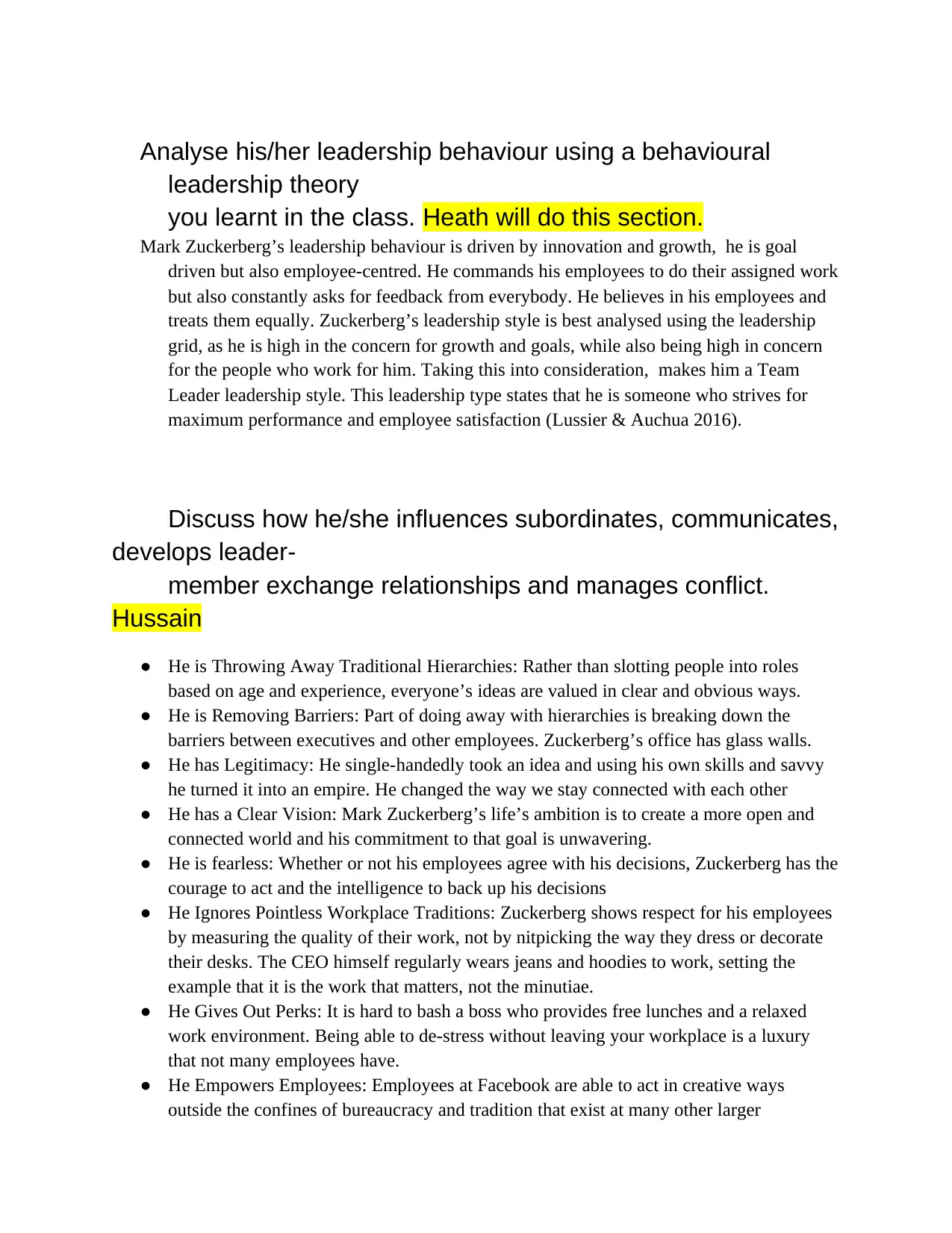
Analyse his/her leadership behaviour using a behavioural
leadership theory
you learnt in the class. Heath will do this section.
Mark Zuckerberg’s leadership behaviour is driven by innovation and growth, he is goal
driven but also employee-centred. He commands his employees to do their assigned work
but also constantly asks for feedback from everybody. He believes in his employees and
treats them equally. Zuckerberg’s leadership style is best analysed using the leadership
grid, as he is high in the concern for growth and goals, while also being high in concern
for the people who work for him. Taking this into consideration, makes him a Team
Leader leadership style. This leadership type states that he is someone who strives for
maximum performance and employee satisfaction (Lussier & Auchua 2016).
Discuss how he/she influences subordinates, communicates,
develops leader-
member exchange relationships and manages conflict.
Hussain
● He is Throwing Away Traditional Hierarchies: Rather than slotting people into roles
based on age and experience, everyone’s ideas are valued in clear and obvious ways.
● He is Removing Barriers: Part of doing away with hierarchies is breaking down the
barriers between executives and other employees. Zuckerberg’s office has glass walls.
● He has Legitimacy: He single-handedly took an idea and using his own skills and savvy
he turned it into an empire. He changed the way we stay connected with each other
● He has a Clear Vision: Mark Zuckerberg’s life’s ambition is to create a more open and
connected world and his commitment to that goal is unwavering.
● He is fearless: Whether or not his employees agree with his decisions, Zuckerberg has the
courage to act and the intelligence to back up his decisions
● He Ignores Pointless Workplace Traditions: Zuckerberg shows respect for his employees
by measuring the quality of their work, not by nitpicking the way they dress or decorate
their desks. The CEO himself regularly wears jeans and hoodies to work, setting the
example that it is the work that matters, not the minutiae.
● He Gives Out Perks: It is hard to bash a boss who provides free lunches and a relaxed
work environment. Being able to de-stress without leaving your workplace is a luxury
that not many employees have.
● He Empowers Employees: Employees at Facebook are able to act in creative ways
outside the confines of bureaucracy and tradition that exist at many other larger
leadership theory
you learnt in the class. Heath will do this section.
Mark Zuckerberg’s leadership behaviour is driven by innovation and growth, he is goal
driven but also employee-centred. He commands his employees to do their assigned work
but also constantly asks for feedback from everybody. He believes in his employees and
treats them equally. Zuckerberg’s leadership style is best analysed using the leadership
grid, as he is high in the concern for growth and goals, while also being high in concern
for the people who work for him. Taking this into consideration, makes him a Team
Leader leadership style. This leadership type states that he is someone who strives for
maximum performance and employee satisfaction (Lussier & Auchua 2016).
Discuss how he/she influences subordinates, communicates,
develops leader-
member exchange relationships and manages conflict.
Hussain
● He is Throwing Away Traditional Hierarchies: Rather than slotting people into roles
based on age and experience, everyone’s ideas are valued in clear and obvious ways.
● He is Removing Barriers: Part of doing away with hierarchies is breaking down the
barriers between executives and other employees. Zuckerberg’s office has glass walls.
● He has Legitimacy: He single-handedly took an idea and using his own skills and savvy
he turned it into an empire. He changed the way we stay connected with each other
● He has a Clear Vision: Mark Zuckerberg’s life’s ambition is to create a more open and
connected world and his commitment to that goal is unwavering.
● He is fearless: Whether or not his employees agree with his decisions, Zuckerberg has the
courage to act and the intelligence to back up his decisions
● He Ignores Pointless Workplace Traditions: Zuckerberg shows respect for his employees
by measuring the quality of their work, not by nitpicking the way they dress or decorate
their desks. The CEO himself regularly wears jeans and hoodies to work, setting the
example that it is the work that matters, not the minutiae.
● He Gives Out Perks: It is hard to bash a boss who provides free lunches and a relaxed
work environment. Being able to de-stress without leaving your workplace is a luxury
that not many employees have.
● He Empowers Employees: Employees at Facebook are able to act in creative ways
outside the confines of bureaucracy and tradition that exist at many other larger
Paraphrase This Document
Need a fresh take? Get an instant paraphrase of this document with our AI Paraphraser
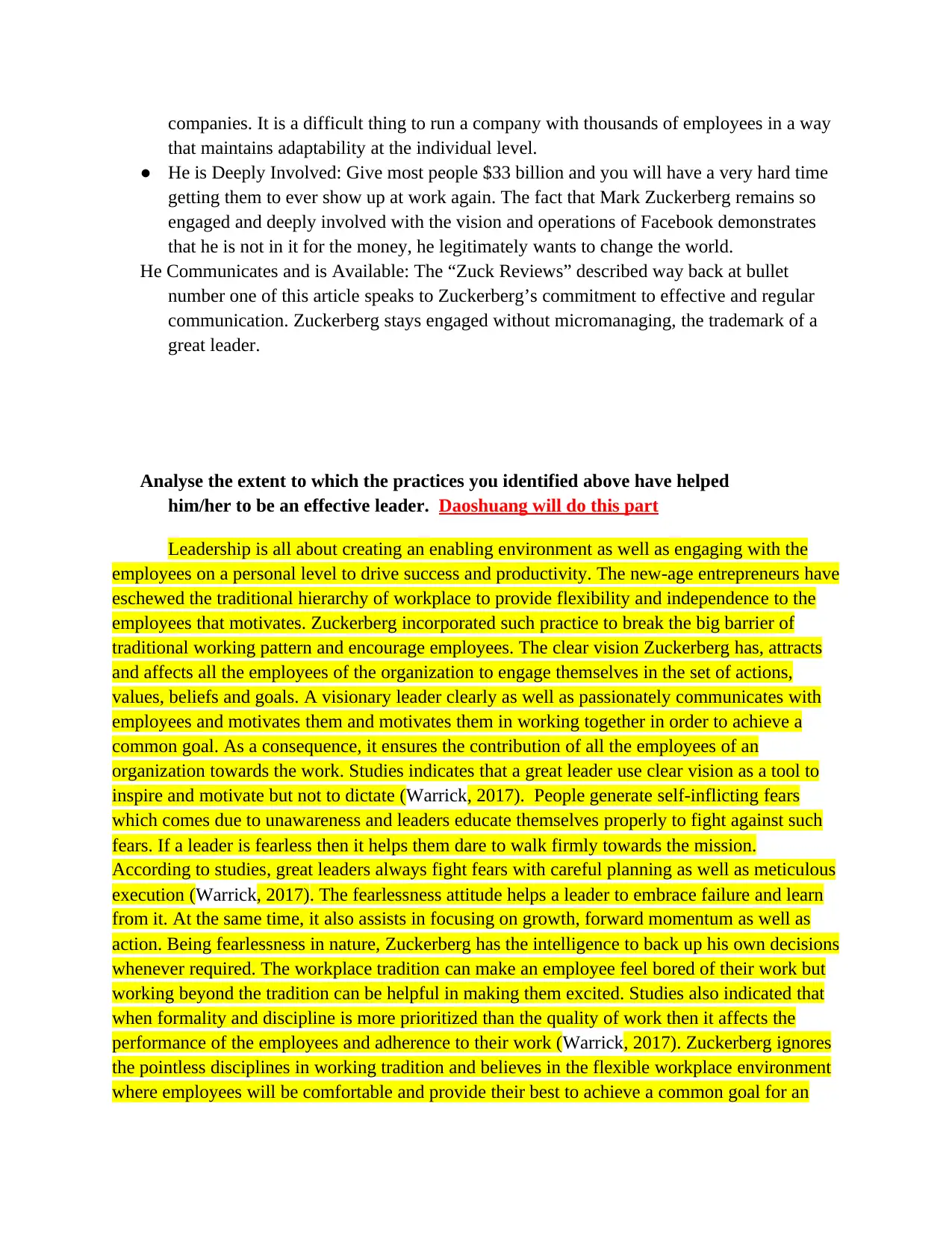
companies. It is a difficult thing to run a company with thousands of employees in a way
that maintains adaptability at the individual level.
● He is Deeply Involved: Give most people $33 billion and you will have a very hard time
getting them to ever show up at work again. The fact that Mark Zuckerberg remains so
engaged and deeply involved with the vision and operations of Facebook demonstrates
that he is not in it for the money, he legitimately wants to change the world.
He Communicates and is Available: The “Zuck Reviews” described way back at bullet
number one of this article speaks to Zuckerberg’s commitment to effective and regular
communication. Zuckerberg stays engaged without micromanaging, the trademark of a
great leader.
Analyse the extent to which the practices you identified above have helped
him/her to be an effective leader. Daoshuang will do this part
Leadership is all about creating an enabling environment as well as engaging with the
employees on a personal level to drive success and productivity. The new-age entrepreneurs have
eschewed the traditional hierarchy of workplace to provide flexibility and independence to the
employees that motivates. Zuckerberg incorporated such practice to break the big barrier of
traditional working pattern and encourage employees. The clear vision Zuckerberg has, attracts
and affects all the employees of the organization to engage themselves in the set of actions,
values, beliefs and goals. A visionary leader clearly as well as passionately communicates with
employees and motivates them and motivates them in working together in order to achieve a
common goal. As a consequence, it ensures the contribution of all the employees of an
organization towards the work. Studies indicates that a great leader use clear vision as a tool to
inspire and motivate but not to dictate (Warrick, 2017). People generate self-inflicting fears
which comes due to unawareness and leaders educate themselves properly to fight against such
fears. If a leader is fearless then it helps them dare to walk firmly towards the mission.
According to studies, great leaders always fight fears with careful planning as well as meticulous
execution (Warrick, 2017). The fearlessness attitude helps a leader to embrace failure and learn
from it. At the same time, it also assists in focusing on growth, forward momentum as well as
action. Being fearlessness in nature, Zuckerberg has the intelligence to back up his own decisions
whenever required. The workplace tradition can make an employee feel bored of their work but
working beyond the tradition can be helpful in making them excited. Studies also indicated that
when formality and discipline is more prioritized than the quality of work then it affects the
performance of the employees and adherence to their work (Warrick, 2017). Zuckerberg ignores
the pointless disciplines in working tradition and believes in the flexible workplace environment
where employees will be comfortable and provide their best to achieve a common goal for an
that maintains adaptability at the individual level.
● He is Deeply Involved: Give most people $33 billion and you will have a very hard time
getting them to ever show up at work again. The fact that Mark Zuckerberg remains so
engaged and deeply involved with the vision and operations of Facebook demonstrates
that he is not in it for the money, he legitimately wants to change the world.
He Communicates and is Available: The “Zuck Reviews” described way back at bullet
number one of this article speaks to Zuckerberg’s commitment to effective and regular
communication. Zuckerberg stays engaged without micromanaging, the trademark of a
great leader.
Analyse the extent to which the practices you identified above have helped
him/her to be an effective leader. Daoshuang will do this part
Leadership is all about creating an enabling environment as well as engaging with the
employees on a personal level to drive success and productivity. The new-age entrepreneurs have
eschewed the traditional hierarchy of workplace to provide flexibility and independence to the
employees that motivates. Zuckerberg incorporated such practice to break the big barrier of
traditional working pattern and encourage employees. The clear vision Zuckerberg has, attracts
and affects all the employees of the organization to engage themselves in the set of actions,
values, beliefs and goals. A visionary leader clearly as well as passionately communicates with
employees and motivates them and motivates them in working together in order to achieve a
common goal. As a consequence, it ensures the contribution of all the employees of an
organization towards the work. Studies indicates that a great leader use clear vision as a tool to
inspire and motivate but not to dictate (Warrick, 2017). People generate self-inflicting fears
which comes due to unawareness and leaders educate themselves properly to fight against such
fears. If a leader is fearless then it helps them dare to walk firmly towards the mission.
According to studies, great leaders always fight fears with careful planning as well as meticulous
execution (Warrick, 2017). The fearlessness attitude helps a leader to embrace failure and learn
from it. At the same time, it also assists in focusing on growth, forward momentum as well as
action. Being fearlessness in nature, Zuckerberg has the intelligence to back up his own decisions
whenever required. The workplace tradition can make an employee feel bored of their work but
working beyond the tradition can be helpful in making them excited. Studies also indicated that
when formality and discipline is more prioritized than the quality of work then it affects the
performance of the employees and adherence to their work (Warrick, 2017). Zuckerberg ignores
the pointless disciplines in working tradition and believes in the flexible workplace environment
where employees will be comfortable and provide their best to achieve a common goal for an
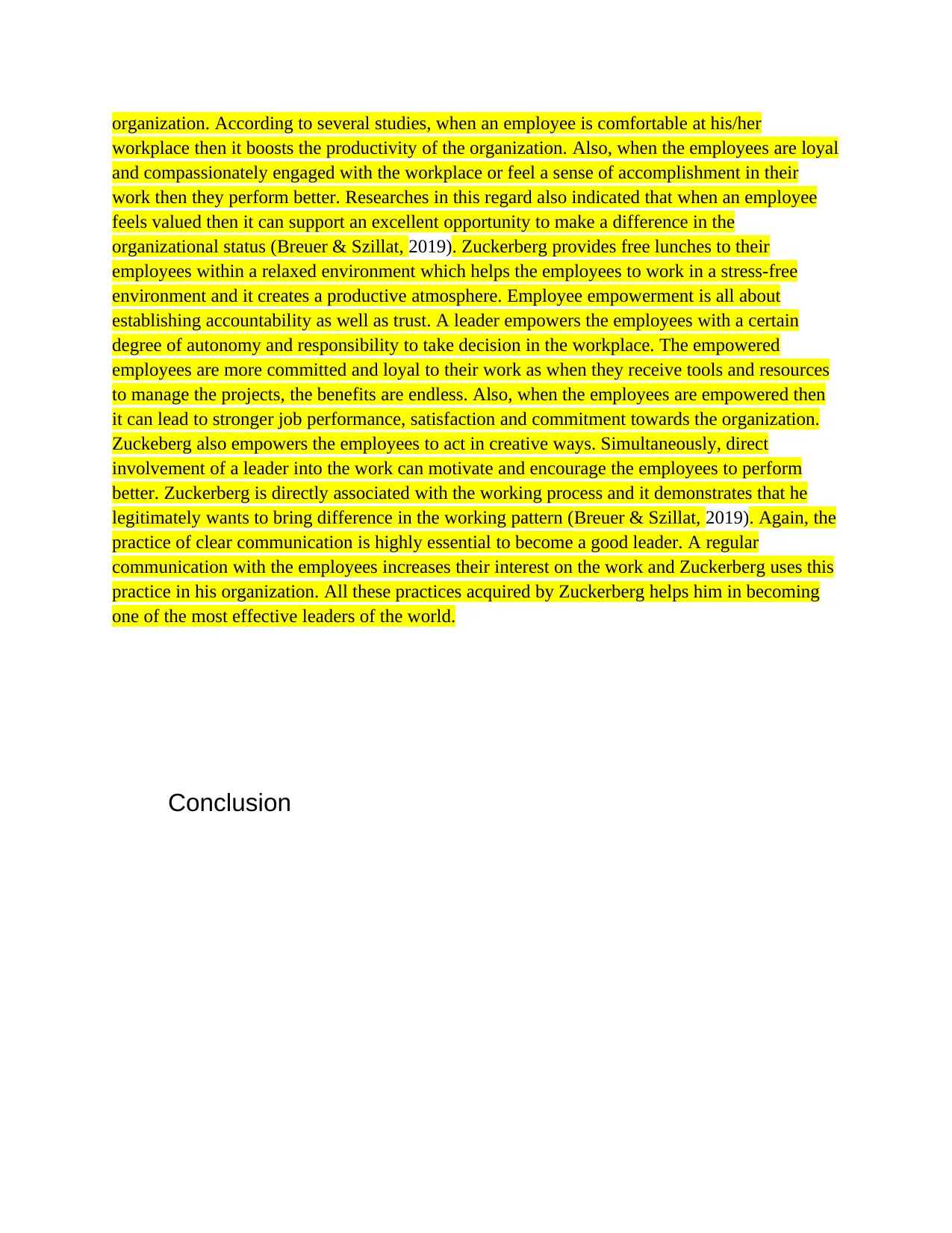
organization. According to several studies, when an employee is comfortable at his/her
workplace then it boosts the productivity of the organization. Also, when the employees are loyal
and compassionately engaged with the workplace or feel a sense of accomplishment in their
work then they perform better. Researches in this regard also indicated that when an employee
feels valued then it can support an excellent opportunity to make a difference in the
organizational status (Breuer & Szillat, 2019). Zuckerberg provides free lunches to their
employees within a relaxed environment which helps the employees to work in a stress-free
environment and it creates a productive atmosphere. Employee empowerment is all about
establishing accountability as well as trust. A leader empowers the employees with a certain
degree of autonomy and responsibility to take decision in the workplace. The empowered
employees are more committed and loyal to their work as when they receive tools and resources
to manage the projects, the benefits are endless. Also, when the employees are empowered then
it can lead to stronger job performance, satisfaction and commitment towards the organization.
Zuckeberg also empowers the employees to act in creative ways. Simultaneously, direct
involvement of a leader into the work can motivate and encourage the employees to perform
better. Zuckerberg is directly associated with the working process and it demonstrates that he
legitimately wants to bring difference in the working pattern (Breuer & Szillat, 2019). Again, the
practice of clear communication is highly essential to become a good leader. A regular
communication with the employees increases their interest on the work and Zuckerberg uses this
practice in his organization. All these practices acquired by Zuckerberg helps him in becoming
one of the most effective leaders of the world.
Conclusion
workplace then it boosts the productivity of the organization. Also, when the employees are loyal
and compassionately engaged with the workplace or feel a sense of accomplishment in their
work then they perform better. Researches in this regard also indicated that when an employee
feels valued then it can support an excellent opportunity to make a difference in the
organizational status (Breuer & Szillat, 2019). Zuckerberg provides free lunches to their
employees within a relaxed environment which helps the employees to work in a stress-free
environment and it creates a productive atmosphere. Employee empowerment is all about
establishing accountability as well as trust. A leader empowers the employees with a certain
degree of autonomy and responsibility to take decision in the workplace. The empowered
employees are more committed and loyal to their work as when they receive tools and resources
to manage the projects, the benefits are endless. Also, when the employees are empowered then
it can lead to stronger job performance, satisfaction and commitment towards the organization.
Zuckeberg also empowers the employees to act in creative ways. Simultaneously, direct
involvement of a leader into the work can motivate and encourage the employees to perform
better. Zuckerberg is directly associated with the working process and it demonstrates that he
legitimately wants to bring difference in the working pattern (Breuer & Szillat, 2019). Again, the
practice of clear communication is highly essential to become a good leader. A regular
communication with the employees increases their interest on the work and Zuckerberg uses this
practice in his organization. All these practices acquired by Zuckerberg helps him in becoming
one of the most effective leaders of the world.
Conclusion
⊘ This is a preview!⊘
Do you want full access?
Subscribe today to unlock all pages.

Trusted by 1+ million students worldwide
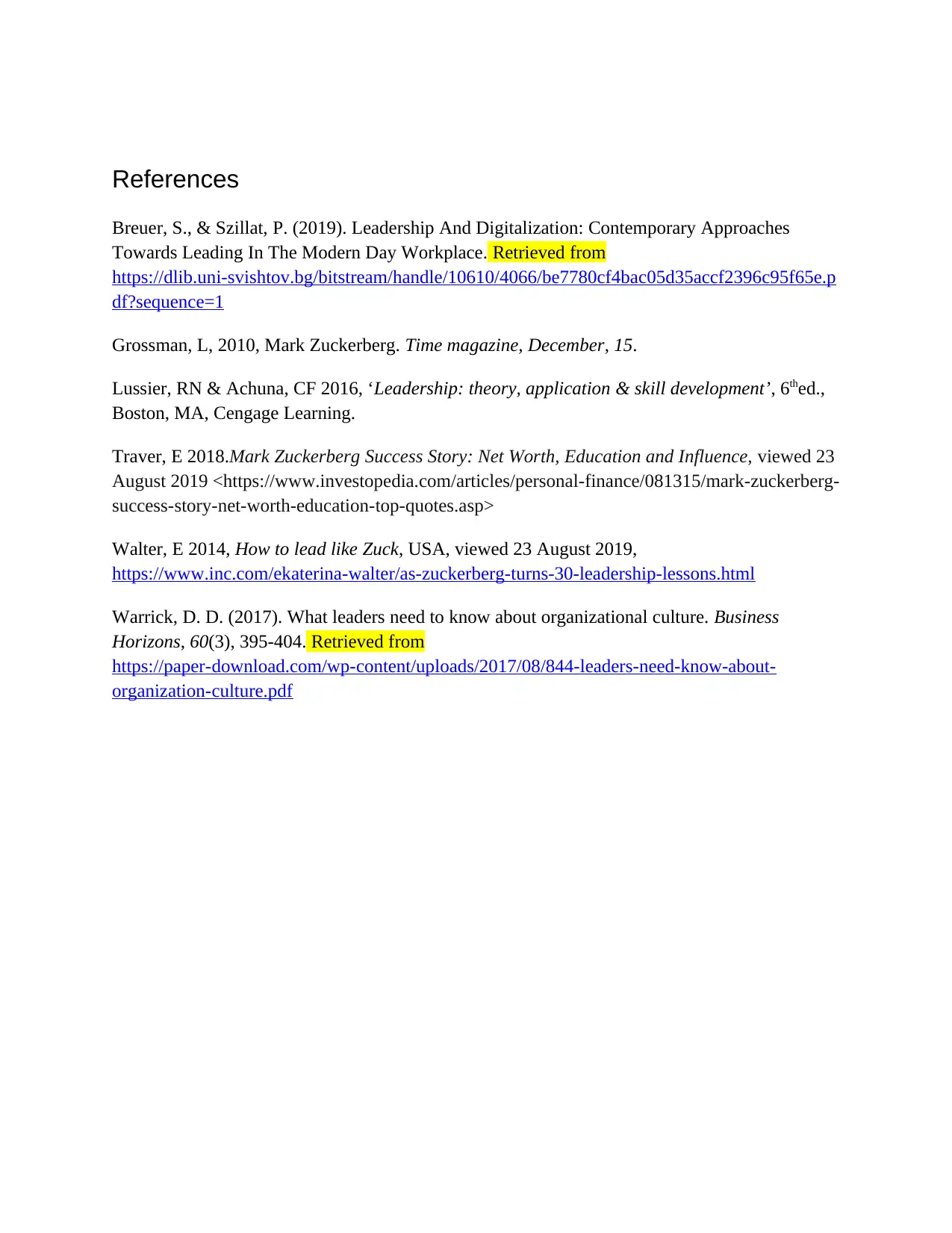
References
Breuer, S., & Szillat, P. (2019). Leadership And Digitalization: Contemporary Approaches
Towards Leading In The Modern Day Workplace. Retrieved from
https://dlib.uni-svishtov.bg/bitstream/handle/10610/4066/be7780cf4bac05d35accf2396c95f65e.p
df?sequence=1
Grossman, L, 2010, Mark Zuckerberg. Time magazine, December, 15.
Lussier, RN & Achuna, CF 2016, ‘Leadership: theory, application & skill development’, 6thed.,
Boston, MA, Cengage Learning.
Traver, E 2018.Mark Zuckerberg Success Story: Net Worth, Education and Influence, viewed 23
August 2019 <https://www.investopedia.com/articles/personal-finance/081315/mark-zuckerberg-
success-story-net-worth-education-top-quotes.asp>
Walter, E 2014, How to lead like Zuck, USA, viewed 23 August 2019,
https://www.inc.com/ekaterina-walter/as-zuckerberg-turns-30-leadership-lessons.html
Warrick, D. D. (2017). What leaders need to know about organizational culture. Business
Horizons, 60(3), 395-404. Retrieved from
https://paper-download.com/wp-content/uploads/2017/08/844-leaders-need-know-about-
organization-culture.pdf
Breuer, S., & Szillat, P. (2019). Leadership And Digitalization: Contemporary Approaches
Towards Leading In The Modern Day Workplace. Retrieved from
https://dlib.uni-svishtov.bg/bitstream/handle/10610/4066/be7780cf4bac05d35accf2396c95f65e.p
df?sequence=1
Grossman, L, 2010, Mark Zuckerberg. Time magazine, December, 15.
Lussier, RN & Achuna, CF 2016, ‘Leadership: theory, application & skill development’, 6thed.,
Boston, MA, Cengage Learning.
Traver, E 2018.Mark Zuckerberg Success Story: Net Worth, Education and Influence, viewed 23
August 2019 <https://www.investopedia.com/articles/personal-finance/081315/mark-zuckerberg-
success-story-net-worth-education-top-quotes.asp>
Walter, E 2014, How to lead like Zuck, USA, viewed 23 August 2019,
https://www.inc.com/ekaterina-walter/as-zuckerberg-turns-30-leadership-lessons.html
Warrick, D. D. (2017). What leaders need to know about organizational culture. Business
Horizons, 60(3), 395-404. Retrieved from
https://paper-download.com/wp-content/uploads/2017/08/844-leaders-need-know-about-
organization-culture.pdf
1 out of 7
Your All-in-One AI-Powered Toolkit for Academic Success.
+13062052269
info@desklib.com
Available 24*7 on WhatsApp / Email
![[object Object]](/_next/static/media/star-bottom.7253800d.svg)
Unlock your academic potential
Copyright © 2020–2025 A2Z Services. All Rights Reserved. Developed and managed by ZUCOL.

